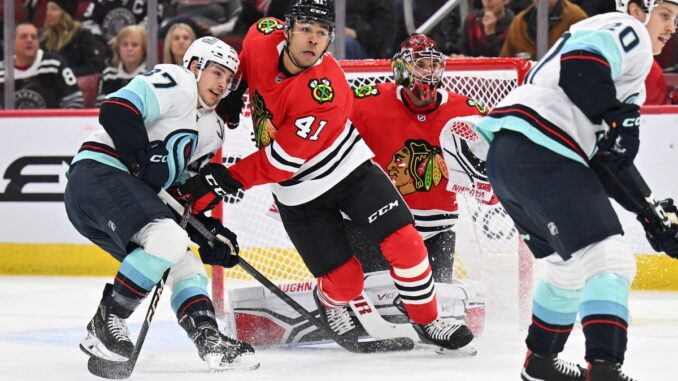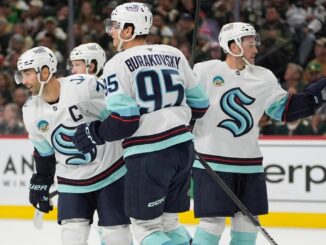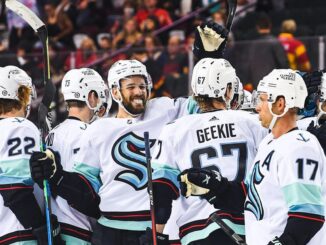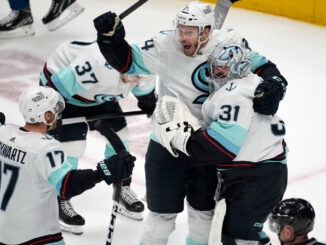
With the NHL recently passing the halfway mark of the 2022-23 season, now is an appropriate time to evaluate how the Seattle Kraken have fared in their second season of existence.
The Pacific Division club currently owns a record of 26-14-4, recently becoming the first team in NHL history to sweep a seven-game road trip. As a result, they sit second in the Pacific (and fourth in the Western Conference), trailing the division-leading Vegas Golden Knights by two points with a game in hand.
The Kraken have significantly improved over last year’s 60-point debut campaign and have their sights set on the franchise’s first playoff appearance. Even so, the team is not perfect. There are several potential areas of concern that, if not addressed, could spell an early end to an otherwise positive season.
It also doesn’t help that Seattle’s prime-age skaters have accelerated the organization’s timeline for competitiveness. Sure, centers Matty Beniers (20 years old) and Shane Wright (19) are promising building blocks for the Kraken’s future, but five of the team’s highest-paid forwards, four of its five highest-paid defensemen, and its highest-paid goaltender are all aged 27 or older.
As a result, the organization must walk the tightrope of not mortgaging the future while also needing to capitalize on a surprisingly successful season. So, with just over a month to go until the NHL’s trade deadline (March 3rd), let’s highlight three of the Kraken’s biggest needs as the big day draws closer.
Need #1: Play-Driving Forward
After scoring at a miserable rate of 2.63 goals per game last season (29th in the NHL), the Kraken offense was transformed in 2022-23. Their 3.66 goals per game rank fourth leaguewide and has been driven in part by an entire season of Beniers, as well as the offseason additions of Andre Burakovsky and Oliver Bjorkstrand. In that sense, suggesting that adding another forward should be their priority might be confusing, but bear with me.
The Kraken have undoubtedly improved their underlying process in attack since last season, increasing their shot- and chance-generation at 5-on-5. Unfortunately, they still sit in the bottom half of the league by those metrics but have managed to overcome those warts by shooting at 11% at 5-on-5 and 12.3% in all situations, with both marks ranking first in the NHL.
It’s possible that the Kraken roster is filled with above-average finishers who can consistently outperform their expected goals rates, but that’s not usually a recipe for long-term success.
Related: 4 Seattle Kraken Predictions For The Second Half Of The 2022-2023 Season
They currently rank below the league average in the percentage of their entries that are carried in with possession which is less than ideal given that those types of entries are more likely to result in shots, chances, and goals than simple dump-ins.
The Kraken likely won’t keep converting on their chances at a league-best rate, but generating a higher rate of scoring chances could provide a buffer against the inevitable regression in shooting luck.
A play-driving forward who can transport the puck from zone to zone and complete high-danger passes should be the primary target at the deadline. Those types of players are usually in short supply and command a heftier price, but it’s a dynamic the Kraken lineup sorely needs to maintain their strong performance so far this season.
Need #2: Starting Goaltender
Owning the league’s highest shooting percentage (SH%) has helped mask most, if not all, of the Kraken’s warts. The most significant of said warts is Seattle’s goaltending, an issue that has carried over from 2021-22.
Despite committing nearly $8 million to Philipp Grubauer ($5.9 million) and Martin Jones ($2 million) this season in the crease, Seattle ranks 29th in team save percentage (SV%) with a mark of .888. That’s a slight improvement on the .880 SV% posted by Kraken netminders in 2021-22 (dead last), but not by much.
Most of the consternation is with Grubauer, who earned a sizeable contract in free agency on the heels of the 2019-20 season, in which he was named a Vezina Trophy finalist.
Since then, he ranks 71st out of 73 qualified goalies (minimum 20 games played) in SV% (.889) and has allowed the most goals above expected (GSAx). For the ninth-highest-earning goaltender in the NHL this season, that return on investment is unacceptable.
Related: Is The Seattle Kraken’s Offensive Success In 2022-2023 For Real?
The 33-year-old Jones has provided some stability in Grubauer’s stead, claiming the starting job after the German went down with an injury early in the season. Still, his .895 SV% in 32 games is only the 52nd-best mark among qualified goalies (minimum ten games played), and he hasn’t posted a SV% over .900 since the 2017-18 campaign. He was steady to start the year, but that looks like a temporary mirage.
Since the start of the 2020-21 season, Grubauer and Jones rank 61st and 72nd in SV% out of the 83 qualified netminders (minimum 20 games played) while also allowing the fourth- and sixth-most goals above expected in that span.
At this point, expecting either of the two goaltenders to suddenly revert to starting-caliber options is playing with fire. When one assumes that the Kraken’s sky-high SH% will regress at some point, much better goaltending will be needed to keep the wins coming in the interim.
The Kraken are right up against the salary cap and have multi-year commitments to both Grubauer and the injured Chris Driedger, so inserting yet another netminder could prove to be difficult. Driedger could return before the end of the season, and he could offer the reprieve they need, but it’s unfair to expect him to immediately do so after such a lengthy layoff.
If the Kraken hope to capitalize on their unexpected success this season, they might not have a choice but to seek reinforcements in the crease.
Need #3: Puck-Moving Defenseman
The third and final need is not as pressing as the first two but could simultaneously improve the Kraken’s results in both areas.
Apart from Vince Dunn and Justin Schultz, there is a dearth of puck-moving ability on the Kraken blueline. Consequently, Seattle grades out near league average in the rate at which they successfully complete defensive zone exits, which could be contributing to their inability to carve out a greater volume of quality scoring chances.
Related: Seattle Kraken Get Intriguing Piece By Claiming Tolvanen
Defenders are a big part of a team’s breakout strategy, so having individuals equipped with the necessary tools is key to moving the puck out regularly. Whether they use their skating skills or a quick first pass isn’t as important as just being capable of facilitating a successful transition with possession.
Adding such a defenseman could make it easier for the forwards to generate clean zone entries, perhaps making trading for a forward redundant. It’s arguable which would cost more in terms of assets, but the Kraken could likely add both at a reasonable price.
Kraken Shaping up to Be a Western Conference Contender
As teams hanging on in their respective playoff races fall off the pace, the league’s collection of sellers and buyers should become clearer, as should the players headlining the trade market.
At that point, I will profile several of the Kraken’s most suitable trade targets and assess how likely they will make their way to the Pacific Northwest.
Until then, sit back and enjoy the ride – these are exciting times.
Data courtesy of AllThreeZones, Evolving Hockey, Hockey Reference, and Natural Stat Trick. Statistics are accurate prior to games being played on January 19th.




